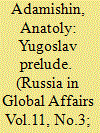| Srl | Item |
| 1 |
ID:
065750


|
|
|
| 2 |
ID:
124393


|
|
|
|
|
| Publication |
2012.
|
| Summary/Abstract |
The summer of 2012 witnessed a flare up of hostilities in the remote Gorno-Badakhshan region in Tajikistan and government troops had to be sent in. This took place just weeks after Tajikistan had celebrated the fifteenth anniversary of the end of its civil war, a struggle that had almost destroyed the country. At the time, Tajikistan was in a fragile state, having just emerged as an independent country after the breakup of the Soviet Union. The peace agreement signed in Moscow in 1997 provided an opportunity to overcome inter-clan and religious rifts in Tajik society through gradual democratization. However, the country's leadership opted for a different sort of policy, and this is the root cause of the problems that we are seeing today. They will have to be addressed again at some point.
|
|
|
|
|
|
|
|
|
|
|
|
|
|
|
|
| 3 |
ID:
127012


|
|
|
|
|
| Publication |
2013.
|
| Summary/Abstract |
A major task of global diplomacy is settling local war-related international crises. However, the post-Cold War period has witnessed the emergence of some new trends. Instead of taking a neutral stance whenever and wherever possible, and pushing warring parties towards peace, leading Western powers are beginning to act differently. In most trouble spots, a 'right' party - the good guys - is chosen that enjoys the political, military, and diplomatic support it needs to achieve a victory over the bad guys. Proceeding from their current interests, more powerful countries often ignore the fact that, as a rule, there is no right or wrong party in domestic conflicts and civil wars; indeed, the responsibility often lies with both sides. Recently, there have been many examples of such a policy, so it might be interesting to look back at how it all began - in Yugoslavia in the early 1990s
|
|
|
|
|
|
|
|
|
|
|
|
|
|
|
|
| 4 |
ID:
161029


|
|
|
|
|
| Summary/Abstract |
Amajor task of global diplomacy is settling local war-related international crises. However, the post-Cold War period has witnessed the emergence of some new trends. Instead of taking a neutral stance whenever and wherever possible, and pushing warring parties towards peace, leading Western powers are beginning to act differently.
|
|
|
|
|
|
|
|
|
|
|
|
|
|
|
|